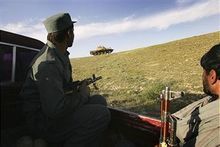 As NATO leaders gather for a key summit in Lisbon, expect the newspapers to be full of
the usual “why bother” commentary. NATO, they will argue, was founded for a different age and is not relevant for dealing with today’s threats – from cyber-attacks to
nuclear non-proliferation. It is even struggling to deal with older threats, such as the Taliban insurgency.
As NATO leaders gather for a key summit in Lisbon, expect the newspapers to be full of
the usual “why bother” commentary. NATO, they will argue, was founded for a different age and is not relevant for dealing with today’s threats – from cyber-attacks to
nuclear non-proliferation. It is even struggling to deal with older threats, such as the Taliban insurgency.
Most Europeans do not seem to mind. They feel safer than at any time before and worry predominantly about post-material threats, not conventional attack, as a think tank report showed recently. As a result, Europeans are set to spend less on defence. Germany expert Hans Kundnani has an excellent piece on Berlin’s anti-militarism over on ECFR’s new blog.
What Europeans do spend on defence remains ill-spent on bloated, stationary forces that are of little use in today’s world. To give an example, the Greek military owns enough battle-tanks to circle the Paris ring-road – twice. But what are they for? Greece is hardly going to repel a Turkish land offensive.
Even in otherwise pugilistic nations, like Britain, the neo-isolationist chorus is becoming louder. For the Left, the noble intensions of liberal intervention have been rubbed away by the grubby reality of warfare. For the realist Right, overseas interventions have distracted from the pursuit of Britain’s national interest. The neo-conservatives, meanwhile, are in a minority or distracted by ministerial duties. Simon Jenkins seized the moment a few months ago, during the SDSR, to argue for a Costa Rica-style disbandment of the military.
Sorry for sounding like the hawk I am, but every category of risk facing NATO is growing. Islamist extremists are a formidable threat. They are fighting to reconstitute their safe havens in Afghanistan and keep them in Pakistan. They are working to acquire weapons of mass destruction to use against NATO allies. Military power will be needed to address this threat. Both North Korea and Iran are steadily increasing the range, payload, and accuracy of their ballistic missiles. No one seriously believes that the Iranians will voluntarily stop their nuclear programme. Military power is a key deterrent – and may be needed to stop the programmes.
Then there is the challenge represented by China, which is developing the military capacity to challenge the interests of the West. Here too military power will be key, not necessarily because a confrontation with China is looming, but because the West will need a credible military capability to project its diplomatic power. Even Brazil has discovered that one’s diplomatic clout increases with military prowess.
At today’s summit, the NATO chief will seek to overcome the neo-isolationist urge and the demilitarization that it might lead to. The world remains a dangerous place, even if the bien-pensant prefer to pretend it is not and the interventionists are keeping their heads down. Let us hope Anders Fogh Rasmussen succeeds in keeping NATO strong, relevant – and powerful.






Comments